The Critical Role of Evidence-Based Practices in Recovery
Substance abuse and mental health disorders pose significant challenges globally, affecting millions of individuals and families. Addressing these challenges requires more than traditional approaches—it demands treatments grounded in rigorous scientific research. Evidence-based practices (EBPs) have emerged as a gold standard for effective intervention, offering validated methods to improve recovery outcomes. This article explores the comprehensive scope of EBPs, their implementation in diverse treatment settings, and how they foster long-term recovery for those battling addiction and co-occurring mental health conditions.
Comprehensive Treatment Services for Addiction and Mental Health Disorders
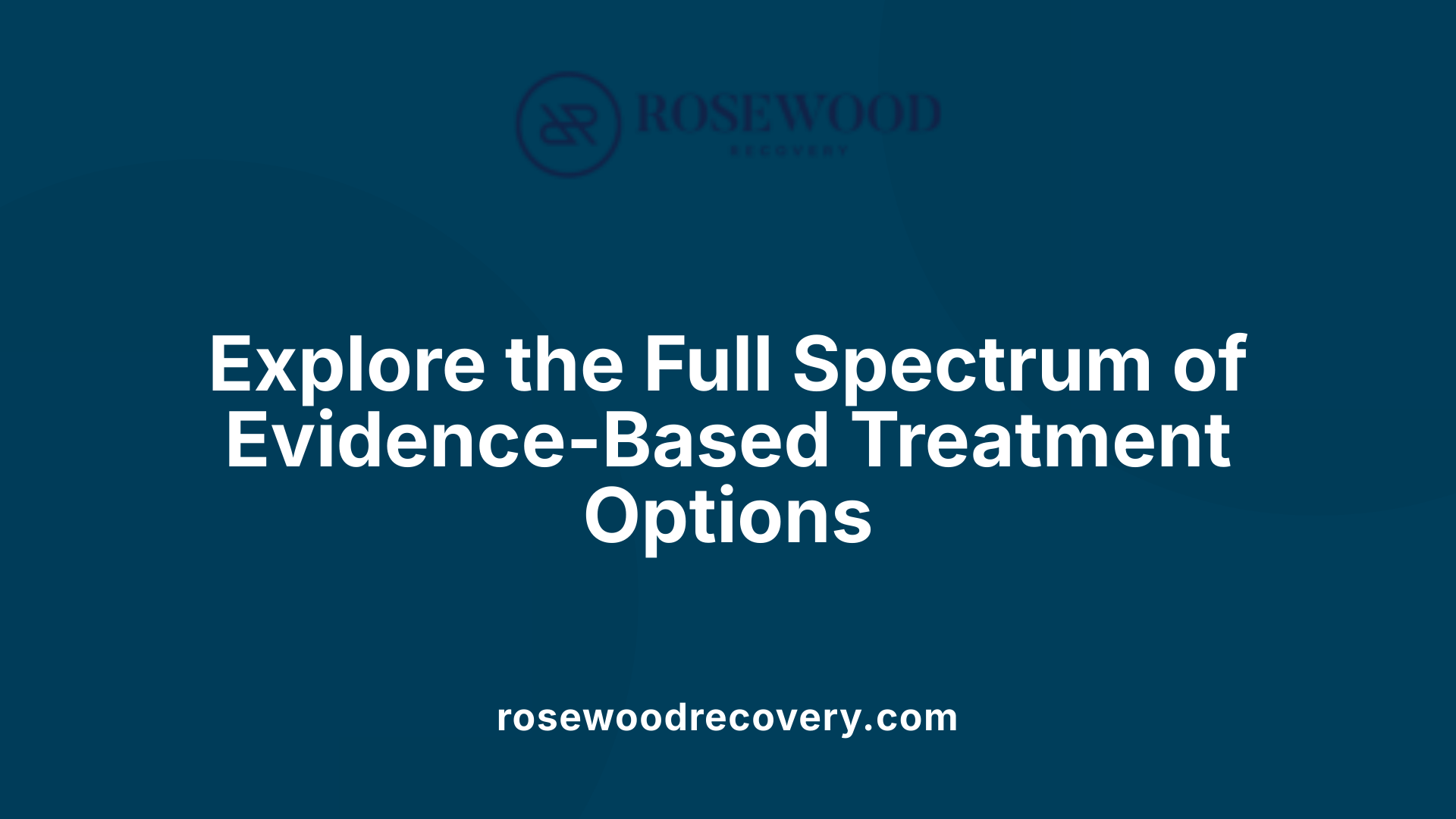
What comprehensive treatment services are available for substance abuse, mental health issues, and various forms of addiction?
Comprehensive treatment for addiction and mental health disorders offers an array of evidence-based services tailored to meet individual needs. These include behavioral therapies such as Cognitive Behavioral Therapy (CBT), Dialectical Behavior Therapy (DBT), Motivational Interviewing (MI), and Contingency Management, all designed to modify behaviors and support recovery.
Medication-assisted treatment (MAT) plays a crucial role, especially for opioid and alcohol use disorders. Medications like buprenorphine, methadone, and naltrexone help reduce cravings and withdrawal, improving treatment adherence. Other medications—including acamprosate and disulfiram—support abstinence and relapse prevention.
Both inpatient and outpatient programs provide structured environments for detoxification, therapy, and ongoing recovery support. Inpatient care offers intensive, 24/7 medical supervision, while outpatient options allow individuals to maintain daily responsibilities with flexible scheduling.
Holistic and personalized care approaches are increasingly emphasized. These combine traditional treatments with therapies addressing physical wellness, nutrition, mindfulness, stress reduction, and emerging digital tools such as telehealth and app-based interventions to enhance engagement and outcomes.
Family involvement through family therapy broadens support systems, improving communication and understanding of addiction as a disease. Crisis resources, including mobile crisis teams and 988 Suicide & Crisis Lifeline, provide immediate intervention to divert individuals from incarceration and guide them toward appropriate care.
Organizations like SAMHSA and the Hazelden Betty Ford Foundation integrate these services within Recovery-Oriented Systems of Care, ensuring a coordinated and culturally competent approach. Online platforms like FindTreatment.gov assist in locating nearby facilities and support services, fostering accessible pathways to recovery.
Together, these comprehensive services address the complex psychological, social, and physiological aspects of substance use and mental health disorders, supporting sustained recovery and improved well-being.
Core Evidence-Based Therapies in Addiction Treatment
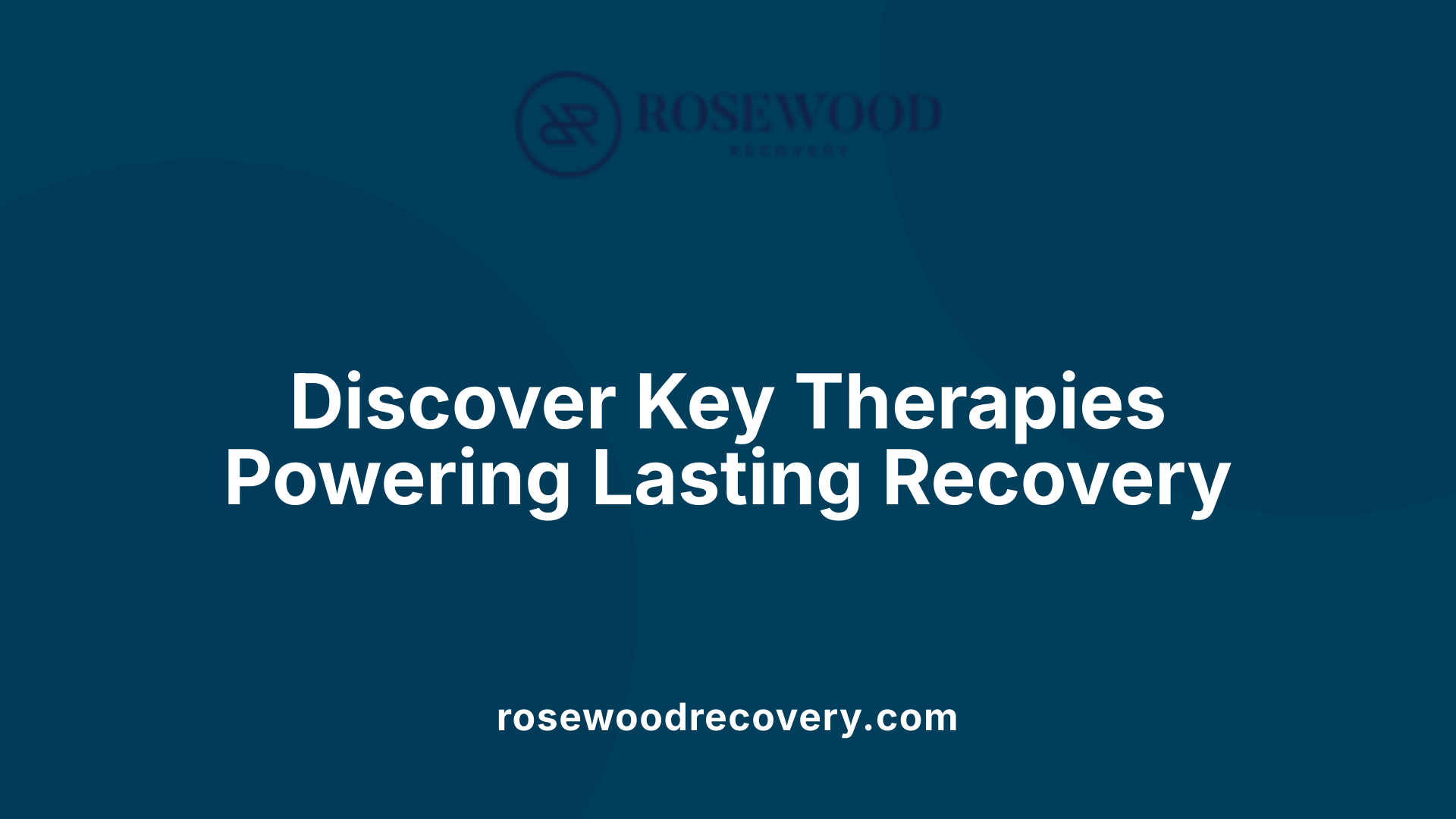
What is Cognitive Behavioral Therapy (CBT) and why is it effective?
Cognitive Behavioral Therapy (CBT) is a widely used psychotherapy that focuses on modifying irrational and harmful beliefs and behaviors. It helps individuals reshape negative thoughts, manage symptoms, prevent relapse, and develop coping strategies essential for recovery. By improving emotional regulation, CBT supports individuals in managing triggers that lead to substance use.
How does Motivational Interviewing (MI) support behavioral change?
Motivational Interviewing (MI) is a client-centered counseling technique designed to build self-efficacy and motivation for change. It creates a collaborative partnership between the clinician and patient, helping especially those who are unmotivated or resistant to embrace positive behavioral changes before engaging in more intensive therapies.
What role does Contingency Management (CM) play in addiction recovery?
Contingency Management (CM) reinforces positive behavioral changes by providing tangible incentives, such as vouchers or social rewards, for maintaining sobriety or passing drug tests. This positive reinforcement enhances motivation and promotes sustained recovery.
How is Dialectical Behavioral Therapy (DBT) useful for individuals with addiction?
Dialectical Behavioral Therapy (DBT), a specialized form of CBT, emphasizes the development of behavioral skills including mindfulness, distress tolerance, emotion regulation, and interpersonal effectiveness. These skills help individuals manage intense emotions, reduce impulsive behaviors, and improve communication, making it effective in treating addiction alongside co-occurring mental health conditions.
Why is Twelve-step facilitation important in addiction treatment?
Twelve-step facilitation encourages active participation in peer support groups such as Alcoholics Anonymous (AA) or Narcotics Anonymous (NA). These programs emphasize acceptance of addiction as a chronic disease, surrender to a higher power, and ongoing involvement in recovery activities. Peer support environments provide accountability, shared experiences, and social support, which are associated with improved treatment retention and long-term abstinence.
These core therapies, supported by extensive clinical research, form the basis of effective addiction treatment and provide essential tools for individuals seeking lasting recovery.
Medications as Evidence-Based Interventions in Recovery

Medications for Opioid Use Disorder: Buprenorphine, Methadone, and Naltrexone
Medications play a crucial role in the evidence-based treatment of opioid use disorder (OUD). Buprenorphine and methadone are opioid agonists that help reduce cravings and withdrawal symptoms by stabilizing brain chemistry without producing the same high. Naltrexone, an opioid antagonist, blocks opioid receptors to prevent relapse by eliminating the euphoric effects if opioids are used.
Medications for Alcohol Use Disorder: Acamprosate, Disulfiram, and Naltrexone
For alcohol use disorder, acamprosate helps maintain abstinence by restoring neurotransmitter balance disturbed by chronic alcohol use. Disulfiram produces unpleasant reactions to alcohol consumption, serving as a deterrent. Naltrexone also reduces the rewarding effects of alcohol, lowering the risk of relapse.
Medical Detoxification Processes
Medical detoxification is often the critical first step in recovery. It involves supervised withdrawal from substances to manage acute physical symptoms safely. Detox provides a medically supported environment that prepares individuals for subsequent therapy and long-term recovery.
Integration of Pharmacotherapy with Behavioral Therapies
Pharmacological treatments are most effective when combined with behavioral therapies like Cognitive Behavioral Therapy (CBT) or Motivational Interviewing. This integrated approach addresses both the biological and psychological aspects of addiction, improving treatment adherence and outcomes.
Role in Reducing Cravings, Withdrawal, and Preventing Relapse
Medications help stabilize neurochemical imbalances, significantly reducing cravings and withdrawal symptoms that often trigger relapse. By mitigating these challenges, pharmacotherapy supports sustained abstinence, improves health outcomes, and enhances overall well-being throughout recovery.
Specialized Therapies Addressing Trauma and Complex Emotional Needs
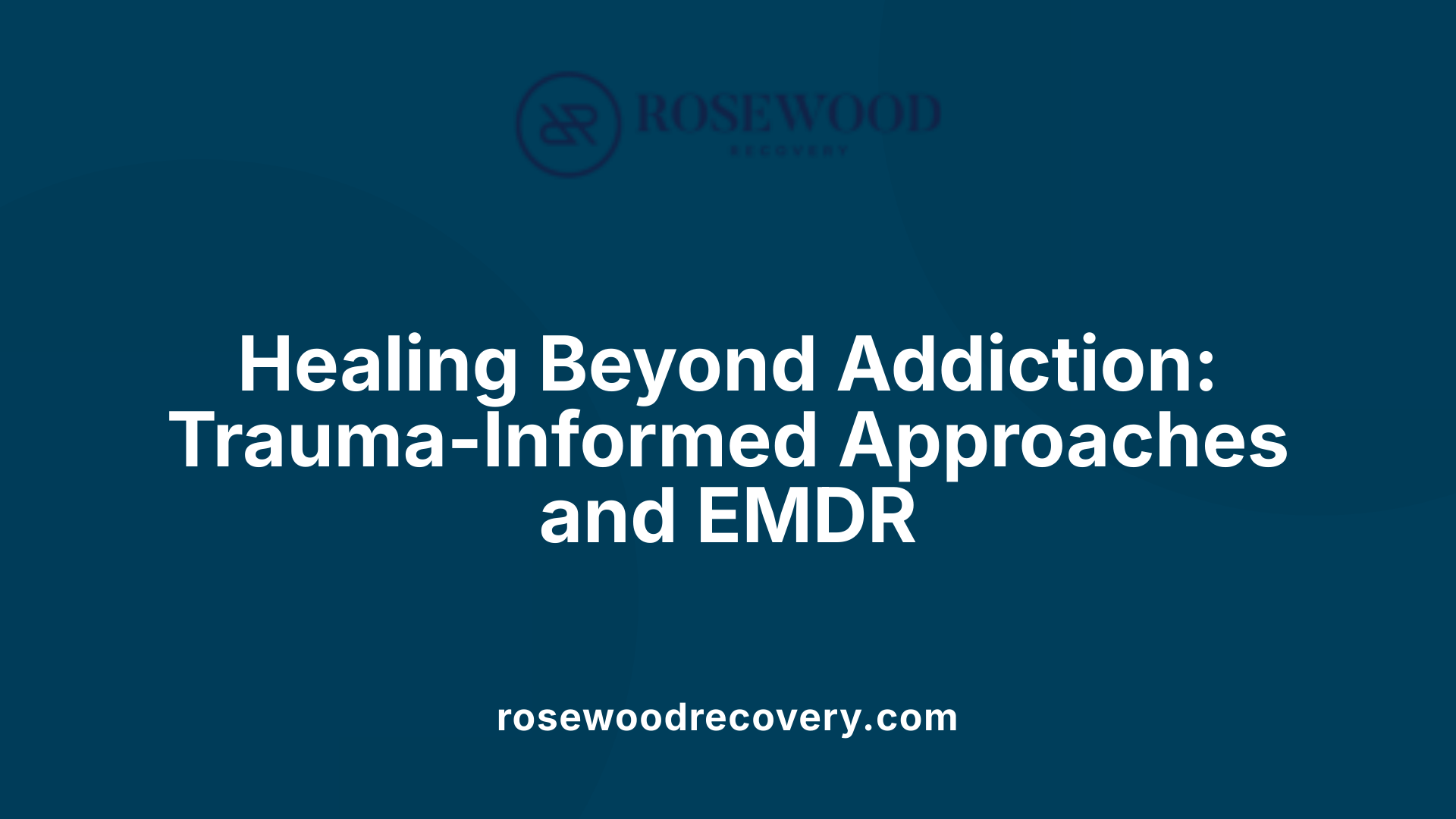
What Are Trauma-Informed Care Principles?
Trauma-informed care is a treatment approach that acknowledges the widespread impact of trauma and integrates this understanding into all aspects of care. It focuses on creating a safe, supportive environment that respects patients' experiences and emphasizes empowerment, trustworthiness, and collaboration.
What Is Eye Movement Desensitization and Reprocessing (EMDR)?
EMDR is a psychotherapeutic treatment specifically designed to alleviate distress associated with traumatic memories. Supported by over 30 controlled outcome studies, EMDR helps patients process and reduce the emotional intensity of traumatic events, facilitating healing and recovery.
What Are Experiential Therapies?
Experiential therapies engage patients through hands-on activities such as art, music, equine (horse-assisted), and adventure therapy. These therapies allow emotional expression and healing for individuals who may find verbal communication challenging, particularly those with complex emotional issues or trauma histories.
How Do These Therapies Benefit Patients with Complex Trauma?
These specialized therapies address emotional regulation, reduce distress, and promote coping strategies in a non-verbal, supportive manner. They are effective for patients who struggle with traditional talk therapies, providing alternative pathways to recovery by tapping into creative and physical expression.
How Are These Approaches Integrated into Comprehensive Recovery Plans?
Incorporating trauma-informed care, EMDR, and experiential therapies into recovery plans ensures a holistic approach that treats both addiction and underlying trauma. This integration supports long-term recovery by addressing emotional wounds and enhancing resilience alongside evidence-based addiction treatments.
Group-Based and Integrated Treatments for Co-Occurring Disorders

How effective are group CBT and contingency management for substance use disorders?
Group Cognitive Behavioral Therapy (CBT) and Contingency Management (CM) have demonstrated strong effectiveness in treating various substance use disorders. For example, group CBT and CM are more successful in reducing cocaine and methamphetamine use compared to treatment as usual. These group therapies help clients develop coping skills, manage triggers collectively, and stay motivated through positive reinforcement such as tangible incentives.
How are mixed substance use disorders treated with group therapies?
Treatment strategies for mixed substance use disorders often include group CBT, CM, and women-focused recovery groups. Group-based behavioral skills training and evidence-based therapies like Seeking Safety and Dialectical Behavior Therapy (DBT) groups are effective at decreasing both substance use and co-occurring psychiatric symptoms. Combining pharmacotherapy with group CBT results in better outcomes for opioid use disorders than medication alone.
How do group interventions address co-occurring psychiatric disorders?
There is strong evidence supporting group interventions for individuals with co-occurring disorders such as PTSD, schizophrenia, or dual diagnoses involving substance use and mental health conditions. Group behavioral therapies help by providing social support, skills development, and therapeutic engagement tailored to complex emotional and psychiatric needs.
What is the cost-effectiveness and scalability of group treatments?
Group-based treatments are recognized for their cost-effectiveness and wide applicability. Their ability to serve multiple patients simultaneously makes them especially valuable for expanding access and scaling interventions within community-based behavioral health services. These benefits promote broader implementation for diverse populations dealing with addiction and mental health disorders.
What are the limitations of psychoeducational groups alone?
While psychoeducational groups can provide useful information, they are not effective as standalone interventions for substance use or co-occurring psychiatric disorders. Evidence shows that combining psychoeducation with active therapeutic approaches such as CBT or CM results in better substance use reduction and psychiatric symptom improvement.
Today, integrating group therapies like CBT and CM with personalized and pharmacological treatments offers comprehensive, impactful care for individuals with complex co-occurring disorders.
Emerging Technological Innovations in Evidence-Based Treatment
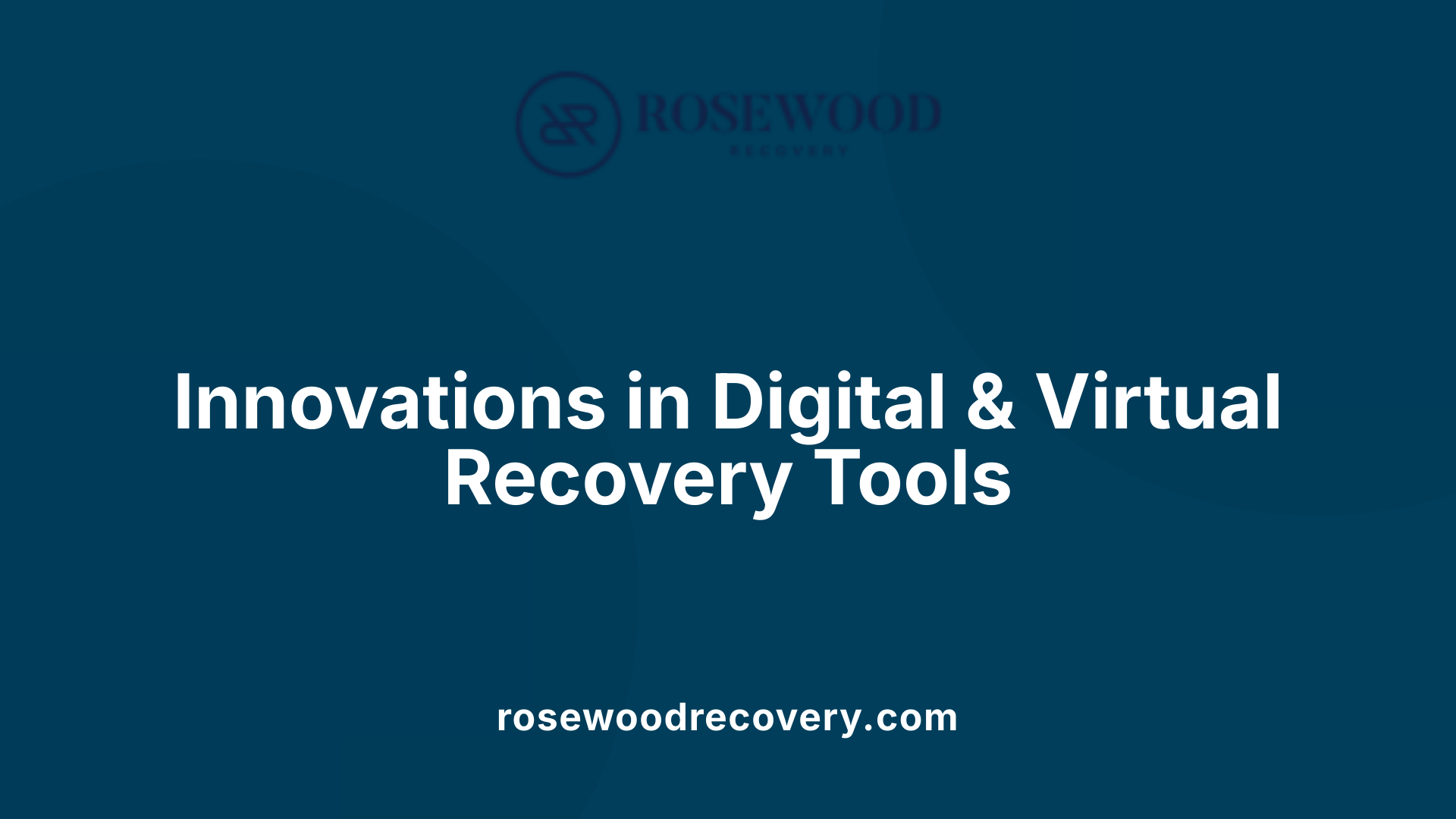
What Are Digital Therapeutics and How Are They Used?
Digital therapeutics have become a promising frontier in addiction and mental health treatment. These include FDA-approved apps that deliver cognitive behavioral therapy (CBT) and contingency management (CM) remotely. Such applications allow patients to engage in structured therapy sessions from home, increasing accessibility and convenience.
How Does Virtual Reality Exposure Therapy Work?
Virtual reality (VR) exposure therapy immerses patients in controlled virtual environments to safely confront triggers and fears. This technology is particularly useful for trauma and anxiety-related conditions, enhancing traditional therapeutic approaches by providing real-time, immersive experiences.
In What Ways Does AI Improve Treatment Matching?
Artificial intelligence (AI) helps personalize addiction and mental health care by analyzing individual data to suggest the most effective treatment options. AI-powered treatment matching aims to increase therapy success rates by tailoring interventions based on genetic, behavioral, and clinical information.
What Is Remote Biometric Monitoring and Mobile Recovery Platforms?
Remote biometric monitoring involves tracking physiological markers such as heart rate or stress levels through wearable devices. Mobile recovery platforms integrate these data with recovery tools, reminders, and peer support, facilitating continuous monitoring and assistance outside traditional clinical settings.
How Is Neurofeedback and Telehealth Expanding Treatment?
Neurofeedback trains patients to regulate brain activity related to addiction and mental health issues, supporting better emotional control. Telehealth expansion, accelerated by the COVID-19 pandemic, allows broader distribution of these therapies through video calls and online resources, breaking down geographic and logistical barriers.
These technological innovations are transforming how evidence-based treatments are delivered, making recovery more accessible, personalized, and engaging for diverse populations.
Personalized Medicine and Tailored Treatment Approaches

How is genetic testing used to tailor medications and dosages in addiction treatment?
Genetic testing plays an increasingly important role in personalized addiction treatment by helping clinicians identify the most effective medications and appropriate dosages for individual patients. By analyzing genetic variations, providers can predict how a patient might metabolize certain medications, such as buprenorphine or naltrexone, commonly used for opioid or alcohol use disorders. This targeted approach reduces trial-and-error periods and enhances treatment efficacy.
How does individualized care improve treatment outcomes?
Personalized care plans crafted through integration of genetic information and patient-specific factors lead to better clinical outcomes. Tailored treatment considers unique biological, psychological, and social components, enabling adjustments in therapy types, medication regimens, and support services. Such customization supports higher engagement, reduces relapse rates, and boosts overall wellbeing by aligning interventions with patients’ specific needs and circumstances.
In what ways does personalized medicine reduce side effects?
By selecting medications best suited to a patient’s genetic profile and sensitivity, personalized medicine minimizes adverse side effects and enhances tolerability. This reduces the likelihood of treatment discontinuation due to medication intolerance or negative reactions. Patients benefit from a safer, more comfortable treatment experience that supports sustained adherence to recovery programs.
How is personalized medicine integrated with traditional and holistic support systems?
Personalized medicine complements traditional behavioral therapies and holistic approaches by creating a comprehensive Recovery-Oriented System of Care. Integration involves combining individualized pharmacological treatments with cognitive-behavioral therapies, peer support, mindfulness practices, nutrition, and physical activity. This approach respects the whole person, including social and cultural contexts, thereby strengthening recovery and facilitating social reintegration.
Addressing Systemic and Social Determinants to Enhance Recovery Outcomes
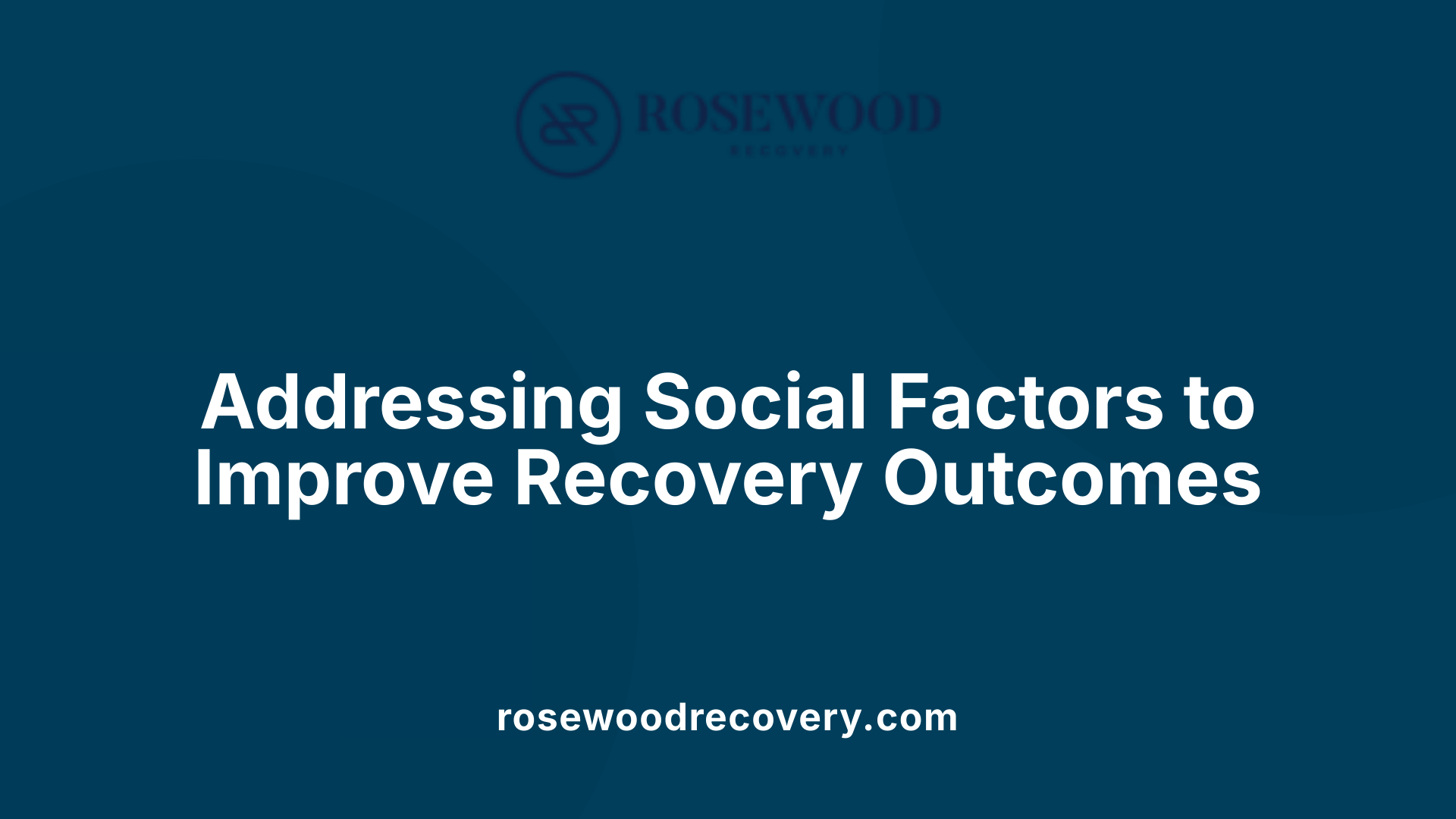
Impact of Social Determinants like Housing, Poverty, and Education
Recovery outcomes are deeply influenced by social determinants such as stable housing, poverty level, and educational opportunities. These factors affect access to care, treatment adherence, and overall behavioral health. Individuals facing housing instability or economic hardship often encounter barriers that complicate sustaining long-term recovery.
Equity and Access Challenges Revealed by COVID-19 and Racial Justice Protests
The COVID-19 pandemic and racial justice protests have brought systemic inequities in behavioral health to the forefront. Marginalized communities experienced disproportionate impacts, revealing gaps in access to quality care, culturally appropriate services, and support systems. These challenges underscore the urgency for systemic reforms to achieve equitable recovery outcomes.
Policy Advances to Expand Community-Based Workforce and Cultural Competence
Policy initiatives now emphasize strengthening the behavioral health workforce by enhancing diversity and cultural competence training. Expanding community-based and peer recovery support workforce improves engagement and tailoring of services to diverse populations. Outcome-focused accountability measures ensure these efforts translate to improved care quality and effectiveness.
Decriminalization and Crisis Response Systems
Efforts to decriminalize mental illness and substance use disorders are pivotal in reducing incarceration and negative police interactions. Establishing crisis response systems such as mobile crisis teams and crisis stabilization beds helps divert individuals into appropriate care settings, fostering better recovery possibilities and lessening the burden on the judicial system.
Lower-Threshold Programs to Increase Treatment Entry
Lower-threshold programs like syringe exchanges and overdose prevention services act as entry points into treatment and harm reduction, particularly evident during the pandemic. These programs remove barriers by offering accessible, non-judgmental support and linkage to care, enhancing engagement for individuals who might otherwise avoid traditional treatment settings.
Relapse Prevention Strategies and Sustaining Long-Term Recovery
What are cognitive-behavioral relapse prevention techniques?
Cognitive-behavioral relapse prevention strategies focus on helping individuals identify triggers for substance use and develop effective coping skills. These techniques empower people to manage cravings, restructure negative thoughts, and build confidence in maintaining abstinence. By anticipating challenges and preparing practical responses, cognitive-behavioral relapse prevention reduces the likelihood of a return to substance use.
Why is ongoing support and treatment adjustment important?
Relapse is a common part of the recovery process, highlighting the need for continuous support and flexible treatment plans. Ongoing therapy sessions and regular assessments allow clinicians to modify approaches based on individual progress and emerging needs. Sustained engagement helps address new challenges and reinforces long-term behavioral changes critical for recovery.
How do peer support groups and 12-step programs aid recovery?
Peer support groups, such as those based on 12-step facilitation, provide a judgment-free environment promoting accountability, shared experience, and encouragement. Participating in groups like Alcoholics Anonymous (AA) or Narcotics Anonymous (NA) fosters acceptance of addiction as a disease, cultivates social support, and encourages active involvement in recovery-oriented activities. These factors significantly contribute to sustained abstinence.
What holistic methods support relapse prevention?
Incorporating holistic approaches into relapse prevention enriches recovery by addressing overall wellness. Nutrition supports physical health while mindfulness practices enhance emotional regulation and stress management. Physical activity promotes mental well-being and reduces anxiety. Together, these elements support a balanced lifestyle that fosters resilience against relapse.
How should relapse be understood in recovery?
Relapse should be seen not as a failure but as a part of the recovery journey. It offers valuable insights into personal triggers and vulnerabilities. Recognizing relapse as an opportunity to improve coping strategies and treatment responsiveness promotes a more compassionate, adaptive approach to long-term recovery success.
Future Directions in Evidence-Based Recovery and Behavioral Health
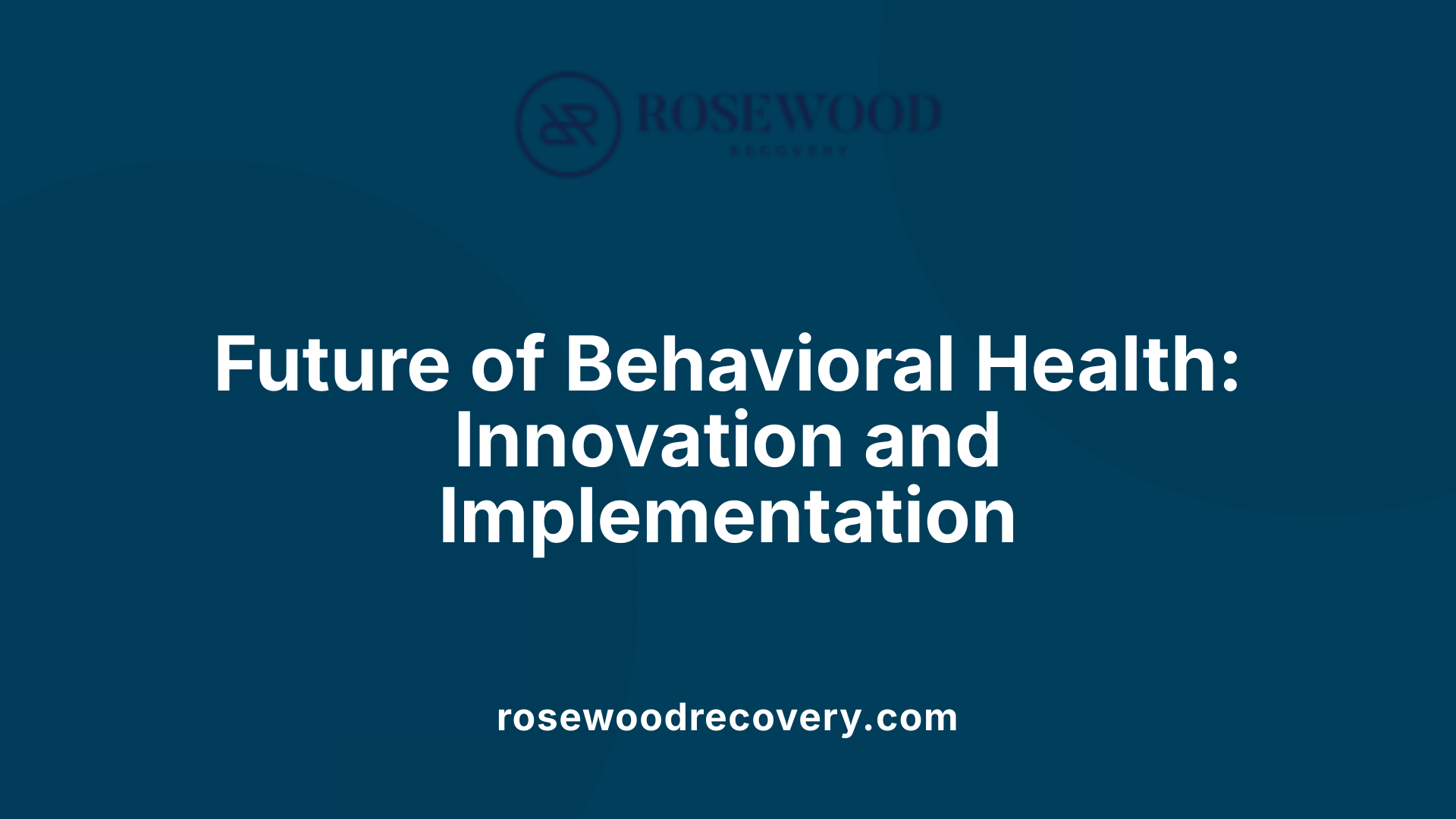
Scaling Evidence-Based Group Programs Due to Cost-Effectiveness
Evidence supports expanding empirically validated group treatments to maximize their benefits. Group programs, such as Cognitive Behavioral Therapy (CBT) and Contingency Management (CM), have demonstrated efficacy across various substance use disorders and co-occurring psychiatric conditions. Their adaptability and broad applicability make them resource-efficient options, providing effective treatment while managing costs.
Expanding Telehealth and Mobile Clinics
The behavioral health system is evolving with increased use of telehealth and mobile clinics. These approaches bring treatment directly to communities and homes, reducing access barriers. Telehealth services extend evidence-based treatments like CBT and motivational interviewing remotely, enhancing reach and continuity of care especially in underserved or rural areas.
Incorporating Outcome-Focused Accountability Measures
To ensure treatment effectiveness, outcome-based accountability is being integrated into behavioral health care. Monitoring recovery indicators helps refine interventions and guide resource allocation. This approach promotes transparency and continuous improvement within systems serving individuals with substance use and mental health disorders.
Fostering Population Health and Integrated Social Services
A comprehensive strategy includes aligning behavioral health with social determinants like housing, education, and poverty reduction. Funding models encouraging integration of social services within care frameworks support sustained recovery and address systemic inequities. This holistic approach aims to improve long-term health outcomes and social reintegration.
Innovations in Workforce Diversity and Peer Recovery Support
Efforts to enhance the behavioral health workforce emphasize cultural competency and diversity training, expanding roles for peer recovery specialists. These initiatives improve engagement, build trust, and provide culturally responsive care. Expanding community-based and peer support programs strengthens the recovery-oriented system to better meet diverse population needs.
Concluding Insights on Evidence-Based Practices Enhancing Recovery
Evidence-based practices represent a transformative approach in treating substance use and mental health disorders, offering a scientifically validated path to recovery. By integrating behavioral therapies, medications, trauma-informed methods, and emerging technologies, treatment becomes more responsive and effective for diverse populations. Recognizing the vital role of social determinants and systemic reform further strengthens the potential for sustained recovery and reintegration. As these practices continue to evolve and scale, supported by robust policy frameworks and community resources, they hold significant promise to improve recovery outcomes and reduce the overall burden of addiction and mental health conditions.
References
- Evidence-Based Practices Resource Center
- Addiction Treatment Methods | Evidence-Based Practices
- Evidence-Based Addiction Therapies & Treatments
- Understanding Evidence-Based Practices for Substance ...
- Evidence-Based Practices in Addiction Treatment
- Transforming Mental Health And Addiction Services
- A review of research-supported group treatments for drug use ...




